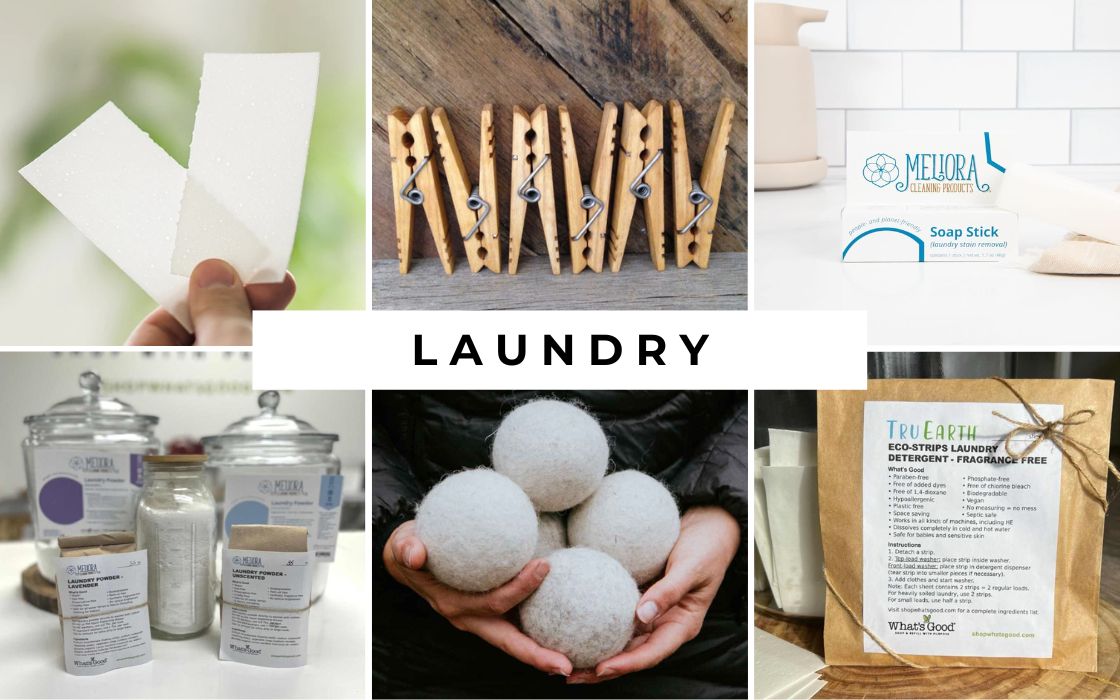FREE 🇺🇸 GROUND SHIPPING Orders 75+
FREE 🇺🇸 GROUND SHIPPING Orders 75+
Add description, images, menus and links to your mega menu
A column with no settings can be used as a spacer
Link to your collections, sales and even external links
Add up to five columns
Add description, images, menus and links to your mega menu
A column with no settings can be used as a spacer
Link to your collections, sales and even external links
Add up to five columns
Living Green: Laundry
January 15, 2024

New Year Habits, Continued...
Last week, in the spirit of fresh starts around the beginning of a new year, we explored several ways we might reduce food waste in our daily lives. In the second week of January, we're focused on making our laundry routine more eco-friendly.
Week 2: Laundry Swaps
Believe it or not, traditional laundry products and practices have a significant impact on the environment, from the use of water and energy to the production of wastewater and air pollution. Many conventional laundry detergents and fabric softeners contain harmful chemicals that can be hazardous to both human health and the environment. Using gentler detergents and air-drying clothes can help extend the life of your clothing, reduce the need for frequent replacements, and overall reduce the environmental impact of clothing production and fashion-related waste.
And here's a fun fact: Your skin is the body's largest organ and as such absorbs 70% of what it comes in contact with. Your feet, eyes and lips absorb 100%! So if you don't make a switch to toxin-detergents to protect local water supplies, do it for your health. What's more, synthetic dyes and fragrances found in many laundry products like detergents and dryer sheets can be disruptive to your endocrine system, especially those of developing bodies.
We can minimize our exposure to these harmful substances, reduce our environmental footprint, and help protect natural resources by choosing products and tools that are more people & planet-friendly.
Here are some easy swaps to try:
Laundry detergent strips

Swap out traditional liquid laundry detergent for an eco-friendly and biodegradable option. Plant-based laundry strips typically have a lower carbon footprint and use less water compared to traditional laundry detergent. They also often come in biodegradable or compostable packaging, which reduces the amount of plastic waste generated from laundry detergent bottles.
Free from harsh chemicals and synthetic fragrances, laundry strips can be a better choice for people with sensitive skin or allergies. Many are cruelty-free (made without animal testing or animal-derived ingredients), making them a more ethical choice for consumers concerned about animal welfare.
Other benefits: There's no shipping water around the globe, because they're concentrated into a paper thin strip. And no plastic jugs to schlep around or recycle. Since each strip is equal to one load of laundry, there's no over pouring, which means no waste.
What's Good carries Tru Earth, which are made in Canada. They're free of phosphates and parabens, and they're hypoallergenic.
Laundry powder

Try laundry powder formulated with plant-based or biodegradable ingredients to effectively remove dirt, stains, and odors. It can be used in both standard and high-efficiency (HE) washing machines, as well as for hand washing delicate items.
Laundry powder is often more affordable than liquid or single-use alternatives, and generally has a longer shelf life compared to liquid options. Some brands offer laundry powder in recyclable or biodegradable packaging, helping to minimize environmental impact by reducing plastic waste. Some laundry powders come in concentrated form, requiring smaller amounts per load, which can lead to less overall product usage and reduced waste.
Our favorite laundry powder by Meliora Cleaning Supplies does all of these things! Also note, we buy and sell in bulk, which means you don't have to worry about wasteful packaging.
Wool dryer balls

Instead of ubiquitous single-use dryer sheets, why not try all-natural, reusable dryer balls? Using multiple dryer balls helps to increase air circulation within the dryer, leading to shorter up to 25% decrease in drying times and therefore potential energy savings. By agitating the fabric and preventing clothes from clumping together, dryer balls can help reduce wrinkles and the need for ironing.
Dryer balls can naturally soften fabrics and minimize static cling without chemicals and synthetic fragrances. Pair them with some organic essential oils for naturally-enhanced freshness. (Read more about using and caring for dryer balls.)
What's Good dryer balls are made in Maine by a minority, woman-owned business using domestic wool. These are some of the tightest woven, long-lasting balls we have ever found. Be sure to check your labels... many are made offshore. Learn more about LooHoo's CEO and Founder in our latest Maker Spotlight.
Air dry clothes

Electric clothes dryers are convenient and speedy, for sure. But drying clothes on a clothesline is making a comeback, and for good reason. Air drying your clothes reduces your energy consumption and saves you money. According to the U.S. Department of Energy, using a clothesline instead of a dryer can save you up to $150 per year. Electric dryers contribute to greenhouse gas emissions and consume a significant amount of energy. By opting for a clothesline, you can help conserve energy and reduce the demand for fossil fuels.
Drying clothes on the line can also extend the lifespan of your garments, because you avoid the high temperatures and tumbling of a machine, which can cause wear and tear over time. Plus, air drying eliminates the need for dryer sheets and fabric softeners, which often contain harmful chemicals that can pollute the air and water.
There's nothing quite like the fresh scent of clothes dried in the open air. Air drying allows your clothes to absorb the natural fragrance of the outdoors, giving them a pleasant smell that cannot be replicated by any fabric softener. Plus, the sun's ultraviolet rays act as a natural disinfectant, helping to kill bacteria and remove odors from your garments.
You don't even need a large backyard or a dedicated clothesline to hang dry your clean laundry. If you're tight on space or looking to set this up inside, look for retractable clotheslines and indoor drying racks you can place anywhere.
What's Good offers hand made clothespins crafted using all domestic wood and springs. They're the most durable, long-lasting pins we've found... they will definitely outlast the clothes your hanging, and will hold the weight of your grandmother's quilt.
~
Hopefully, you gleaned some inspiration and some easy ways to go a little more eco in this (yes, mundane — but important) area of your life. Feel free to share your own eco laundry tips and favorite products with our community in the comments!
Next week, we plan to explore simple swaps in your oral health routine that help you move away from one-time-use packaging, artificial ingredients, and plastics in your dental care products.
~The Team at What's Good
For All Shades of Green™
Leave a comment

Good News
If any email is worthy of your inbox, it's this. Our goal is 1–2x per month. You'll get helpful & inspiring eco info, plus subscriber-only discounts.
Welcome to What's Good
Here's your $10 coupon
COPY THIS CODE TO USE IN CHECKOUT
